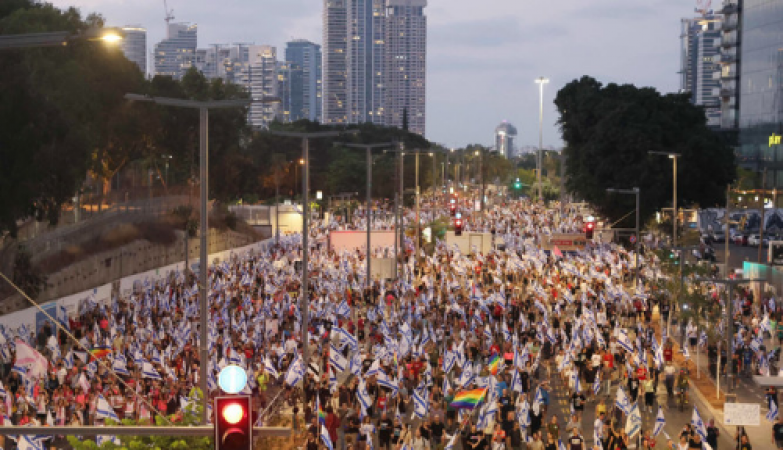
Tel aviv: On Saturday, tens of thousands of Israelis protested in the streets over the government's decision to push forward with judicial reform despite strong opposition.
Israeli flag-waving protesters gathered in Tel Aviv, the nation's commercial hub, to continue months of demonstrations against Prime Minister Benjamin Netanyahu's plans.
Itay Amram, a film composer, said, "We still love this country and we're trying to fix all the problems.
The 27-year-old raged against what he perceived as the government's "constitutional revolution," telling AFP, "We're not accepting any of it."
Also Read: EU and France Withdraw Aid After Coup in Niger: Assistance Suspended
In the biggest test of public opinion since the government submitted a crucial component of its reforms to a final vote in parliament on Monday, protest organisers promoted rallies across the country, from the northern city of Haifa to Eilat on the Red Sea.
Israel's closest allies, including the United States, expressed concern over the vote to repeal the "reasonableness" law, which allows the Supreme Court to invalidate governmental actions like ministerial appointments.
Israeli medical professionals responded with a brief walkout, and numerous veterans of the armed forces have vowed to stop serving as volunteers. Additionally, trade unions are considering more industrial action.
However, Netanyahu's detractors charge him with trying to usurp power. Netanyahu claims the reform package is required to rebalance the relationship between elected officials and the judiciary.
Also Read: Urgent Appeal: OIC Calls for Immediate Release of Niger President
A demonstrator in Tel Aviv warned on a placard, "We refuse to serve a dictatorship."
Although a precise number of attendees was unavailable, Israel's Channel 13 estimated that the city saw a turnout of over 170,000.
Lotem Pinchover described how she felt "heartbroken, helpless" following Monday's vote while encircled in an Israeli flag in Jerusalem, close to the prime minister's residence.
The 40-year-old academic said, "I'm very afraid of what's happening in Israel right now and I'm very worried about the future of my daughter.
Fears about widening rifts within Israeli society have arisen as a result of months of protests since the judicial package was unveiled in January, some of which were in support of the government.
Pnina Manes, a therapist working at a "psychological first aid" station for protesters in Jerusalem, said the situation "tears families apart."
The 59-year-old said, "It's started to feel like — and it's very sad for me to say so — like two different groups" in Israeli society.
Several petitions challenging Monday's vote have been submitted to the Supreme Court this week, and hearings are scheduled to take place in September.
Also Read: Putin asserts that Russia is open to dialogue with Ukraine
The larger reform package aims to downgrade the status of ministerial legal advisers as well as give the government more control over judge selection.
Due to the summer break for the legislature, the legislative process is currently on hold. Netanyahu has pledged to be transparent in negotiations regarding the next course of action.
After earlier negotiations failed, opposition leaders are still wary of talks with the government, a coalition that also includes far-right and ultra-Orthodox Jewish parties.